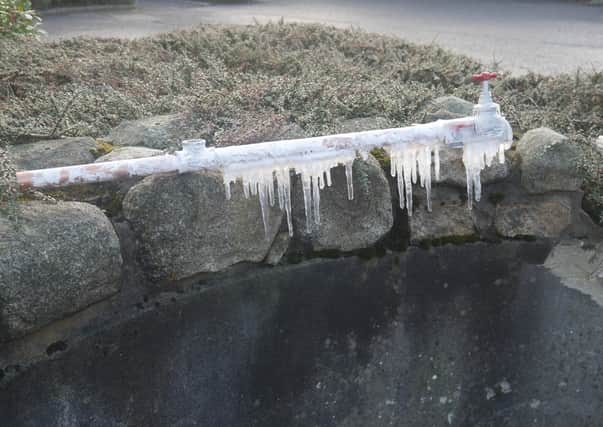Advice for farmers as winter approaches


Des Nevin, NI Water’s Director of Customer and Operations, comments: “It is that time of year when we are asking everyone to prepare their properties against
the effects of freezing temperatures. However, with the continued impact of Covid-19 on our community, it is more vital than ever that householders, landlords, farms and businesses are ready for winter. This means taking action now to ensure pipes are well insulated and everyone in the property knows where the stop valve is located. It is also vital you have a plan to ensure your property is protected if it has to close suddenly for a period of time or through the holiday period.
Advertisement
Advertisement
“The effects of dealing with the aftermath of a burst pipe on a farm cannot be underestimated. Water is the single most important requirement for livestock.
On a dairy farm, livestock drinking water accounts for between 50 % and 75 % of the farm’s water usage. It is therefore vital farmers have a clean constant supply of water.
“On a wider scale, the impact of thousands of litres of water pouring out of burst water pipes can put a huge strain on the distribution network. The Covid-19 crisis has shone a light directly on how vital clean water and sanitation are to everyone. Insulating your pipework is an essential action to
protect your water supply and that of your neighbours.”
UFU deputy president David Brown says:“Water is a daily necessity for farm businesses. It is vital for keeping housed animals hydrated during the winter months, maintaining hygiene within farm facilities such as
Advertisement
Advertisement
milking parlours and for washing machinery. Any disruption to the water system can cause serious difficulties for our farmers not to mention the added
complications of COVID-19 should a water issue arise.”
There are a number of ways farmers can protect their property including:
• Check meters on a regular basis. A higher reading may indicate a leak which should be located and repaired as quickly as possible; Ensure that you have good understanding of the layout of pipework within your land; Consider mapping the line of the pipework, which can extend over several acres of land; Know where your stop valves are located; Ideally, install a number of stop valves to isolate water supply to disused areas of the farm during the winter months; Check for and repair any leakage promptly to reduce water bills, which are a major liability for a working farm; Inspect remote troughs which may not be used at this time of year, particularly the exposed pipe leading into the trough; if cattle are inside consider turning the supply to the trough off; Ensure all underground pipes are buried 750 mms below ground level. Ensure any pipes within buildings are insulated. Examine the adequacy of storage in the event of a supply problem. NI Water recommends at least 24 hours storage.